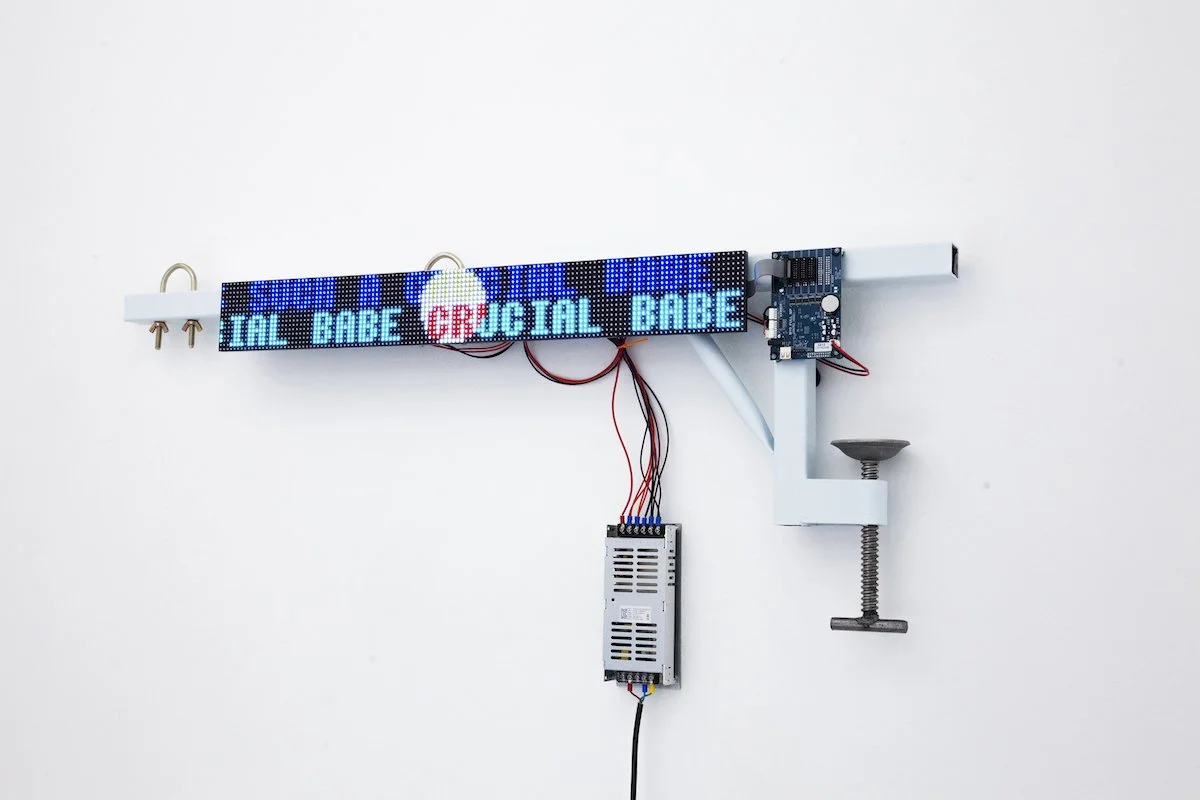Hyun Cho
Introducing Hyun Cho - a ‘hardcore conceptual lover’ working between sculpture and painting and mixing frictioning cultures. The slogan she uses as titles and sometimes subject of her artworks are punk-rock lyrics meant to be as referential as pop culture in its ability to be reiterated and commodified. Hybrid forms of marketed objects are freed from any visible cultural reference while informing spectators of certain signifieds that are always personal and collective as far as a common cultural reference is concerned.
You were born in Korea and grew up between Australia and the US. How do your native culture and Western art influences come together in your works?
There is a cultural indication in my work that is never really found except in the individual minds of the audience. The cultural references in my work are ephemeral; it's as if we're being given an experience of something real that isn't actually present, while also experiencing something real that may not be possible.
Where do you take inspiration from and how would you describe your art practice?
I love pop culture. I'm a big fan of films that mix multiple genres such as realism, surrealism and referencing consumerism and have themes of human dilemmas, adolescent desire, crime and violence. I also get inspiration from things like pulsing LED lights, disassembled kinetics, improvisation, geometric structures and lyrics, among other things.
I'm constantly remixing. I experiment with the meanings of freedom and personal agency in commodified cultures, built environments, and popular culture and redefine them in my own way. The intention in my practice is to create a signifier that reflects all of the cultural and societal references in which I am attracted to while still expressing individualism.
What’s fun about being a hardcore conceptual lover?
Hybridity!
You seem to give importance to works’ titles. Why so? What is the narrative being built through those poem verses-like periphrases?
I'm interested in studying and augmenting language, poetry, and lyricism. Simulating pop culture referentiality through titles is my creative gesture.
My poem Crucial Babe No.1 and a phrase like Ask My Daddy is a self-contained linguistic art that blends my personality with research on the appropriation of popular culture to create my own genre. The lyrical patterns of punk- rock music have influenced my poems and phrases, as I deconstruct their forms and apply their stylistic traits to my text-based sculptures and paintings. My commercialized experiences inspire my texts, which are appealing, short and occasionally sexual in nature to capture the attention while reflecting on the messaging we encounter on a daily basis.
Your works tell of the commodification of any marketed object and - eventually - person. Depersonalized of any particular feature, your works build an iconomy. Social networks, for example, produce reputation, affectivity, dialogues. Icons are what mediate online interactions thus substituting the true reality of interaction. In the same way, the icons you create are symbols, thus signs redirecting to real objects. What do you think about this analysis?
I'm new to the term “iconomy” but familiar with the narratives about ”icon” and “economy” and the overlaps between the two that define our current global culture. In my work, I'm aware that my epoxy resin skateboard conjures the essence of a highly recognizable marketed object— one that is culturally significant for skaters and one that is often co-opted to signify a certain “coolness” or “counterculture.”
The resin wheels are appealing as an icon or symbol as described above, but when they become purely visual objects, I believe the symbolism devolves into utter nonsense. However, this is not my intention. Instead, my approach frees these objects from nostalgia, urban cultural connotations, or assumed purpose biases to demonstrate a form that is uniquely my own.
Iconomies can be universal as they should presume an every-person understanding of an image. Still, your use of irony creates a common ground. What’s your relationship to irony?
When irony is combined with optimism, I find it intriguing. I'm not chasing irony until there is hope and excitement. Rather, metaphors fascinate me. I try to develop the poetic character of metaphors in my works.
interview ILARIA SPONDA
What to read next
















